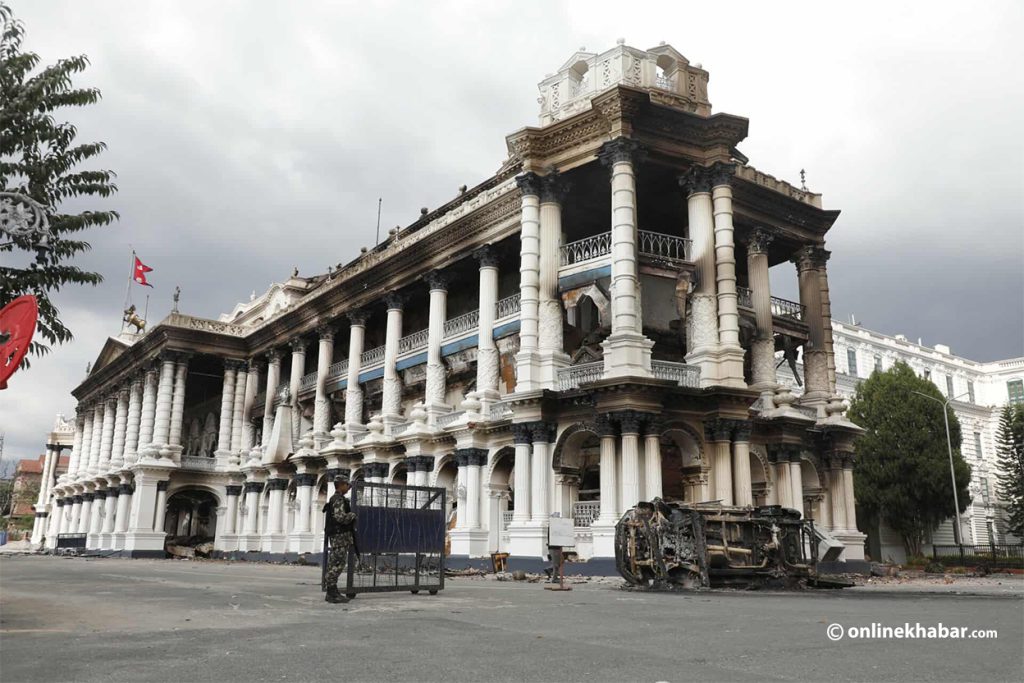
In France, Nepal is mostly known for Mount Everest, with numerous articles from newspapers like Le Monde dedicated to that topic. Politically, however, the country remains widely unknown. The Gen Z uprising, that held on September 8 and 9, came as a shock, even to those who closely follow current events.
Lili, a journalism student says, “It was the first time I’d seen this country in the news.”
On September 12 Yann Barthès — host of one of France’s biggest talk shows, Quotidien, talked about the Gen Z revolution in Nepal, which was viewed by 1.26 million viewers.
In the heart of this historic event, Quotidien highlighted the symbolic weight of the absence of Western journalists in Nepal, another reminder of a country nearly forgotten in global media, overshadowed by China, India, and the rest of the world. This lack of context led to a potentially skewed perception of the violent protests in Kathmandu.
In the age of social media and the race for sensational footage, many French viewers admitted they had seen the dramatic videos before understanding the actual stakes of the protests and the people’s deep-seated distrust toward what they see as a corrupt government.
Many Nepalese, in attempting to explain the situation, described their country as deeply poor, miming the act of stuffing money into pockets, and pointing fingers at their government.
Present in Nepal during this surreal week, we found it hard to depict Kathmandu as a mere representation of popular fury. In more remote neighborhoods, life had stopped. Shops were closed, eyes glued to phones, young people wore police hats playfully — yet the youngest kids kept playing impromptu street soccer matches, far from the destruction and chaos portrayed by the media.
Yes, chaos happened, but even in the midst of a popular uprising, it was targeted and did not involve the entire Nepalis population.
All eyes on Gen Z revolution

Following the events, articles on the Nepal situation flooded the largest French newspapers. Libération published as many articles in one week as it had since the start of 2025. Likewise, Le Figaro, another major French outlet, released a full series on the revolution, despite having mentioned Nepal only a few times earlier in the year.
Amid ongoing protests in France, Nepal’s uprising echoed across social media. The French government, deeply unpopular, was confronted with images of a toppled Nepali regime, with ministers resigning in just three days.
French media outlets on X posted footage from Kathmandu: “Nepali protesters now armed with rifles.” In the comments, users replied: “That’s what we’ll have to do tomorrow,” referring to the upcoming demonstrations in France.
One post showed the Nepalese Finance Minister being chased by protesters into a river, the video racking up 1.8 million views. The comments in the post read: “We should do the same with Bayrou (then Prime Minister) and Retailleau (then Interior Minister).” In reality, this video was just a rumor that many French internet users believed. These surreal beliefs led some French people to want to carry out similar actions, even though they were nothing but fake news.These threats, drowned in the flood of X content, now advocating total free speech
since Elon Musk’s takeover, are nonetheless revealing of the public’s frustration and a
willingness to follow Nepal’s example.
The Nepali inspiration

On September 18, over 500,000 people marched across France to protest political instability, according to government estimates, though union CGT claimed over a million participants.
Among the protesters, some drew unexpected inspiration from Nepal’s Gen Z movement. While there are similarities between the two situations, the motivations and consequences differ greatly.
“Did you see the images of the Nepalese Parliament in flames? The stars are aligning,” declared Anasse, a SUD-Rail unionist specializing in train workers’ conditions, to thunderous applause. A video of Anasse posted by a Le Figaro journalist on X shows him rallying the crowd, citing Nepal’s youth as a symbol, and he’s not alone in doing so.
This is also the case for Lucca, a French-Brazilian student who took part in the demonstration and gave his testimony on the World Socialist Web site. He says, “Everyone must come out and demonstrate, because today, everyone is affected. Everyone must mobilise, we must do as they did in Nepal.”
One Le Figaro headline reads: “We Burn Trash Bins, Then We’ll Burn Matignon Like in Nepal,” quoting a protester eager to force change through radical means.
Still, French protests remain far more peaceful and controlled than those in Nepal. The September 18 demonstrations went off mostly without incident, thanks to heavy police presence. Interior Minister Bruno Retailleau stated: “In most cases, the protests were conducted under proper conditions.”
Nevertheless, the day saw 309 arrests and 134 detentions, with 10 protesters and one journalist injured. These numbers are significant but pale in comparison to the heavy toll in Nepal: 74 dead and hundreds injured in a single week.
A clear contrast is seen in SUD-Rail’s intrusion into France’s Ministry of Economy and Finance, inspired by Nepalese actions. The French protesters entered Bercy, demanding change from officials directly. But in true French fashion, they stayed for only ten minutes, left peacefully, and caused no damage, a far cry from the burning of Parliament in Kathmandu or the physical abuse of ministers.
The core demands also differ. Nepalis are protesting corruption and nepotism in government and administration. The French, on the other hand, are demonstrating across many sectors for better working conditions and against political paralysis.
And the outcomes? France is far from achieving what Nepal’s Gen Z accomplished. While Nepal saw a temporary governmental shift and a glimmer of hope for the future, France remains stuck in a murky political limbo with little progress. The latest Prime Minister switch hasn’t convinced many, and a more stable future still seems out of reach.























